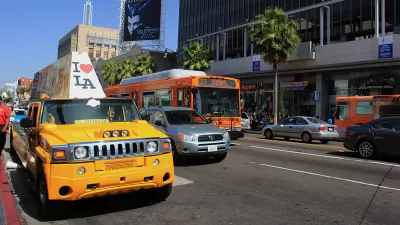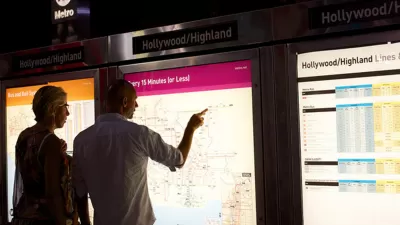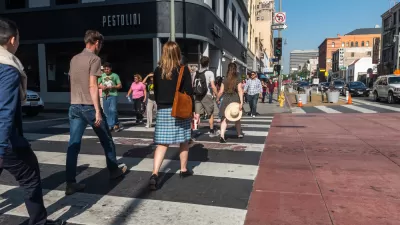LADOT is rehearsing now for the day it has to manage autonomous vehicles alongside delivery drones and air taxis.

Like other cities, Los Angeles is working to get ahead of a seeming whack-a-mole of new transportation choices by integrating them into the model of mobility as a service. In an interview with The Planning Report, LADOT General Manager Seleta Reynolds explains how the city's current initiatives—from open streets events and urban greening to Vision Zero and electrification—are laying the groundwork for the future of urban transportation.
"In my ideal vision of the future city, people have a symphony of transportation choices, such that driving alone is the choice of last resort," Reynolds explains. And in assuming the role of conductor, LADOT is partnering with a full orchestra of city departments like Cultural Affairs, Public Health, and City Planning, plus technology start-ups and more private players, to guide the distributed mobility market toward equity and social responsibility.
For instance, one of LADOT's major new initiatives is a public-private partnership, BlueLA, that provides an electric car-sharing service in low-income parts of the city. Launching the globally successful service in underserved communities before branching out across the city is an intentional strategy meant to "drive investment to neighborhoods that might not be the first in line to get these kinds of new services," Reynolds explains. She also elaborates on the city's multidisciplinary approach to its Vision Zero campaign, which tackles street improvements, art and culture, and vehicle design in an effort to eliminate traffic deaths by 2025.
The bottom line for Reynolds: "Technologies like autonomous vehicles and dockless bikeshare can be part of the solution, but only if we—government, the public sector, and the public—intentionally guide and nudge them toward the future that we want."
FULL STORY: A Symphony of Transportation Choices: LADOT GM Seleta Reynolds' Composition

Alabama: Trump Terminates Settlements for Black Communities Harmed By Raw Sewage
Trump deemed the landmark civil rights agreement “illegal DEI and environmental justice policy.”

Study: Maui’s Plan to Convert Vacation Rentals to Long-Term Housing Could Cause Nearly $1 Billion Economic Loss
The plan would reduce visitor accommodation by 25% resulting in 1,900 jobs lost.

Planetizen Federal Action Tracker
A weekly monitor of how Trump’s orders and actions are impacting planners and planning in America.

Wind Energy on the Rise Despite Federal Policy Reversal
The Trump administration is revoking federal support for renewable energy, but demand for new projects continues unabated.

Passengers Flock to Caltrain After Electrification
The new electric trains are running faster and more reliably, leading to strong ridership growth on the Bay Area rail system.

Texas Churches Rally Behind ‘Yes in God’s Back Yard’ Legislation
Religious leaders want the state to reduce zoning regulations to streamline leasing church-owned land to housing developers.
Urban Design for Planners 1: Software Tools
This six-course series explores essential urban design concepts using open source software and equips planners with the tools they need to participate fully in the urban design process.
Planning for Universal Design
Learn the tools for implementing Universal Design in planning regulations.
Caltrans
Smith Gee Studio
Institute for Housing and Urban Development Studies (IHS)
City of Grandview
Harvard GSD Executive Education
Toledo-Lucas County Plan Commissions
Salt Lake City
NYU Wagner Graduate School of Public Service





























